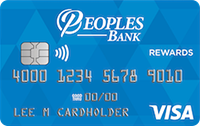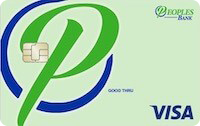Posted On: January 24, 2019 by Peoples Bank in: Financial Education

Credit cards can be a wonderful tool — if used wisely. In addition to the many points and rewards associated with today’s countless card options, credit cards can also be a key ingredient in building up and maintaining a healthy credit score.
But what comes with the good is the potential bad.
Credit cards can be a tempting way to spend lots of money — more than some people can afford. Pair overspending with high interest rates, and that spells trouble. According to the Survey of Consumer Finances, the average credit card debt in the United States is about $5,700 per household. In Iowa, the average debt is $6,696.
Taking advantage of the rewards of each card can be extremely beneficial, but it’s key not to overspend and get carried away.
Take advantage of the awards — but be wary
You’ve likely seen commercials on television touting the next best credit card and its rewards, which usually include some sort of frequent flyer miles, cash back or hotel loyalty points.
Pay your car loan or groceries every month? You should be getting 1 percent cash back with this cool-looking and sleek credit card!
We want to stress this: While the rewards can be beneficial in some instances, if you find yourself struggling to stop spending, it’s well worth it to chuck that piece of plastic for good. No rewards are worth going into credit card debt.
But you can responsibly take advantage of these rewards while avoiding long-term debt. The key is to use your card in accordance with your budget. Act like the card takes money out of your actual bank account. Keep meticulous track of your purchases, and you’ll be less likely to overspend.
If you’re in the market for a new credit card, you can also look at some of the additional perks like free travel insurance, primary and secondary rental-car coverage, price protection and warranties. Paying the balance in full every month will allow you to enjoy the benefits essentially for free.
Use it as an extension of your bank account
As we mentioned above, use your credit card in accordance with your budget. Create a written budget, which you should be doing anyway, and set predetermined spending limits. You’ll still gain the rewards for normal, everyday purchases, and you can gain some of the protections credit cards offer.
The key is to closely track your spending, whether in an Excel document or by checking your account multiple times a week. Keeping up with your spending will allow you to stay responsible and maintain the ability to pay your bill in full every month.
Self-discipline and smart choices can go a long way.
Never, ever pay your bill late
Credit cards often carry hefty interest rates. Some even run up to 25 percent or more, based on the person’s credit score and earning power. Paying your bill in full will allow you to avoid these interest rates. But if you overspend and don’t have the cash to fully cover the bill, the interest rate will kick in on the subsequent monthly payments.
Do your best to at least pay the minimum amount of money and a little more, if you’re able. Whatever you do, avoid missing payments. Doing so will mean late fees and a knock on your credit score. Set a reminder to pay your bill a few days before the due date. Or, even better, set up an automatic payment from your bank account.
If used responsibly, credit cards can yield powerful results. But before swiping that card next time, think to yourself: Can I afford this? Is it worth it? Sometimes that’s all it takes to make the right decision.
Peoples Bank offers uChoose Rewards cards, which allows you to earn one point for every $1 you spend. Each point can be used toward airplane tickets, cash, gift cards and hundreds more merchandise options. There also isn’t a cap for how many points you can earn. Find out more here: https://www.mypeoples.bank/personal/consumer-loans




